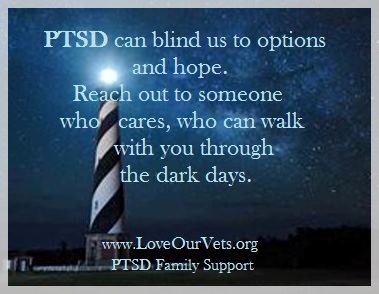Ever wonder why it is so hard for those with PTSD to make decisions, or why they feel so overwhelmed, or why giving up sometimes seems to be the only option? It can be so frustrating when our loved ones seem to recoil at the thought of making a decision, or just see a situation as black and white. Or worse yet…hopeless. How can we best help them in those times without pulling our hair out, blowing up or panicking ourselves?
I am learning that when the brain is triggered, the survival mode dominates. Fight or flight or freeze is all it offers. Some parts of the brain are not accessible at that moment. I wonder if that is one reason why there are so many suicides? Only when the activation calms down can the person utilize the problem solving portion of their brain.
There are many terms for being triggered, and I am sure plenty which I cannot mention here in a “G” rated forum. Some I have heard are activated, hijacked, having an episode, in the zone, out of sorts, phased out, taken over, auto-focused, checked out, facing the demons, switched off, lights on/nobody home, sideswiped, having a moment, in the cave, upset and meltdown. Some may display violent outbursts of rage, while others may be silently sucked into a deep dark hole. Or any combination of these or other reactions. The attacks are unpredictable, and spare no one.
Sound pretty dismal? Yes, but not hopeless.
What seems to help in those fight or flight moments is
connection with someone who cares.
Hopefully that would be us – spouses, family, friends and significant others who love our vets and those with PTSD. Or it could be a support group. Or counselor. Anyone who is there to care and support. Physically, emotionally and spiritually.
We as loved ones can be most helpful by first staying calm ourselves. We need remember that we cannot fix them, and that we too are vulnerable to the triggers. And then as we remain calm, we are able to see and to present options. Most likely we will have to wait until they calm down before they can hear us. In the book LOVE OUR VETS: Restoring Hope for Families of Veterans with PTSD, I share some very practical ways we can most effectively talk with them when they do not seem to hear us.
It helps to remember that they will come out of it. Eventually. Most of our good communication and decision making should take place when we are all calm. (That includes me too!).
One couple has made an agreement that they never make any decisions while upset or activated. They agree to wait. After the activation/hijacking has calmed down, it is easier to see that you do have choices. And things become clearer.
So hang in there in the trigger times. Be patient. The way will open up. Stay calm yourself, and maybe leave the room and go to your favorite space. Call a friend or connect with someone on Facebook . We too need to stay connected with others who understand and are supportive.
And for all who struggle with PTSD, please reach out to those who care. No one needs to be alone. You are a survivor, and you are loved.
Love Our Vets – PTSD Family Support on Facebook
.








